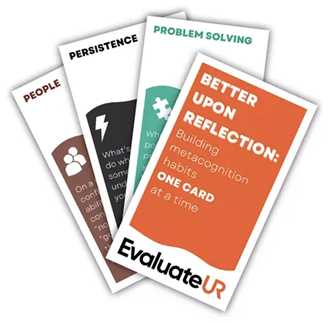by Ashley Welsh, Postdoctoral Teaching & Learning Fellow, Vantage College
First off, I must admit that this blog posting has been a long time coming. I was fortunate enough to meet both John Draeger and Lauren Scharff at the ISSOTL conference in Quebec City in October of 2014. Their “Improving With Metacognition” (IWM) poster was a beacon for someone such as myself who is engaged with metacognition in both my teaching and research. I was thrilled to know there were individuals creating and contributing to a repository of literature and reflections surrounding metacognition. This past January, John asked me to contribute a blog post to the website, however I thought it best to defer my writing until after the completion of my PhD this past spring. Thus, here I am. Ready to write.
For the past 7 years I have been actively engaged with undergraduate science education and research at the University of British Columbia (UBC). Within my research and teaching, I have become increasingly aware of students’ concerns with developing and adapting the appropriate study habits/strategies for success in their introductory courses. This concern was echoed by several of my colleagues teaching large (300+ students/section) introductory math and science courses.
This growing concern led me to exploring students’ metacognitive development in two sections of a large, second year introductory organic chemistry course for biological science majors (~245 students/section). Across the literature and at UBC, this course has a reputation as a challenging, cumulative course where students often fail to develop meaningful learning strategies and fall behind in the course (Grove & Bretz, 2012; Lynch & Trujillo, 2011; Zhao et al., 2014). As a result of its reputation, the instructor with whom I was working designed several formative assessments (e.g. bi-weekly in-class quizzes, written reflections), scaffolded in-class activities (e.g. targeted study strategy readings and discussion), and workshops to improve students’ learning strategies. That is, to improve their ability to control, monitor, evaluate, and plan their learning processes (Anderson & Nashon, 2007; Thomas, 2012). Despite students’ high completion of these targeted activities/homework, many still seemed to be struggling with how to study effectively. As such, we were curious to understand the barriers and supports for students’ metacognitive development in this particular course.
My research adopted an interpretive case study approach (Creswell, 2009; Stake, 1995) with data being collected via a pre/post metacognitive instrument, a student feedback survey, classroom observations, and student interviews. At this point in time I will not get into the nitty gritty details of my thesis, but instead, will draw on a few of the main observations/themes that emerged from my work.
- High stakes assessments may overshadow resources designed for metacognitive development: Within this course, students’ placed considerable emphasis on high stakes assessment as a means for studying, learning, and reflection. Despite students perceiving the formative assessment measures (e.g. in-class quizzes, homework assignments, targeted study strategy activities) as useful to their learning, the majority of them attributed the midterm and final examinations as driving their studying and behaviours. The examinations were worth roughly 75% of students’ grades and as such, students expressed being more concerned with their performance on these high stakes assessments than with their own study strategies. Students indicated that because the formative activities and workshops were only worth about 15% of their grade, they rarely reflected back on these resources or implemented the advised learning strategies. While these resources were designed to provide ongoing feedback on students’ learning strategies and performance, students mentioned that their performance on the first midterm exam was the primary crossroad at which they would explicitly reflect upon their learning strategies. As one student mentioned, “The midterm is the first major point at which you realize you didn’t understand things”. Unfortunately this was often too late in the semester for most students to effectively change their strategies.
- The majority of students reported difficulty implementing metacognitive strategies for enhanced learning: While many students were aware of their weaknesses and lack of concentration when studying, they still struggled with effectively monitoring, evaluating and planning their learning. One student mentioned that “while I do study hard, I don’t think I study smart”. Even when students were aware of their issues, implementing change was difficult as they weren’t exactly sure what to do. Despite the instructor modeling effective strategies and providing multiple opportunities for students to reflect on their learning, several students had difficulty with acknowledging, recognizing, or implementing this advice. Students unanimously praised the efforts of the instructor and the multiple resources she created to support their learning, but outside of class, students often struggled with staying on task or changing their behaviours/attitudes. Some students mentioned they were more concerned with getting a question right than with understanding the problem solving process or with implementing the appropriate strategies for learning. The majority of students I spoke to indicated that throughout their education they had rarely received explicit advice about how to study and some even mentioned that despite writing down the advice they received in class, they were “far too lazy to change”. With learning strategies not taking a primary role in their previous and current education, it’s not surprising that most students found it difficult to implement appropriate strategies for learning.
- Students emphasized the importance of gaining awareness of oneself as a learner and seeking help from others: While students acknowledged that the demanding course material and high-stakes assessments were barriers to their learning, they also noted the critical influence that their own strategies and abilities as learners had on their experience and performance. Some students viewed their own stubbornness or personal issues as reasons why they were “too lazy to change” or more likely to “stick with what I already know. Like memorizing and cramming”. When asked to provide advice for incoming students, all of the students I interviewed (n=26) mentioned the necessity for students to “know yourself and what suits you best. And change it – experiment with it. Know how you study. Know that.” This comment was echoed by several students who emphasized the need for every student to be aware of their weaknesses as learners and to actively and immediately seek help from others when concerned or confused. Students who exhibited effective learning strategies were more likely to attend office hours, to create study groups, and to implement and evaluate the instructor’s study advice. Furthermore, these students could explicitly articulate the strategies they used for studying and could identify which course resources were most influential to their learning approaches.
The three themes described above are only a snapshot of some of the issues unveiled within my doctoral research. They have led me to consider more research that could explore:
- How increasing the weight (percentage of the final grade) of the formative assessment/activities relative to the high-stakes examinations might impact students’ learning strategies/behaviours;
- How to appropriately shift students’ fixations on grades to that of understanding and learning;
- How we might better support students in seeing value in activities, resources, or low-stakes assessment that have been designed to support them as metacognitive, confident learners; and
- How we might achieve these assessment and learning goals in large, introductory science courses.
I look forward to any comments/questions you have on this topic!
-Ashley
——————————–
Anderson, D., & Nashon, S. (2007). Predators of knowledge construction: Interpreting students’ metacognition in an amusement park physics program. Science Education, 91(2), 298-320. doi: 10.1002/sce.20176
Creswell, J. W. (2009). Research design, qualitative, quantitative, and mixed methods approaches (3rd ed.). Thousand Oaks, CA: Sage.
Grove, N. P., & Bretz, S. L. (2012). A continuum of learning: from rote memorization to meaningful learning in organic chemistry. Chemistry Education Research and Practice, 13, 201-208.
Lynch, D. J., & Trujillo, H. (2011). Motivational beliefs and learning strategies in organic chemistry. International Journal of Science and Mathematics Education, 9(1351- 1365).
Stake, R. E. (1995). The art of case study research. Thousand Oaks, CA: Sage.
Thomas, G. (2012). Metacognition in science education: Past, present, and future considerations. In B. J. Fraser, K. Tobin & C. J. McRobbie (Eds.), Second International Handbook of Science Education (pp. 131-144): Springer International Handbooks of Education.
Zhao, N., Wardeska, J. G., McGuire, S. Y., & Cook, E. (2014). Metacognition: An effective tool to promote success in college science learning. Journal of College Science Teaching, 43(4), 48-54.



